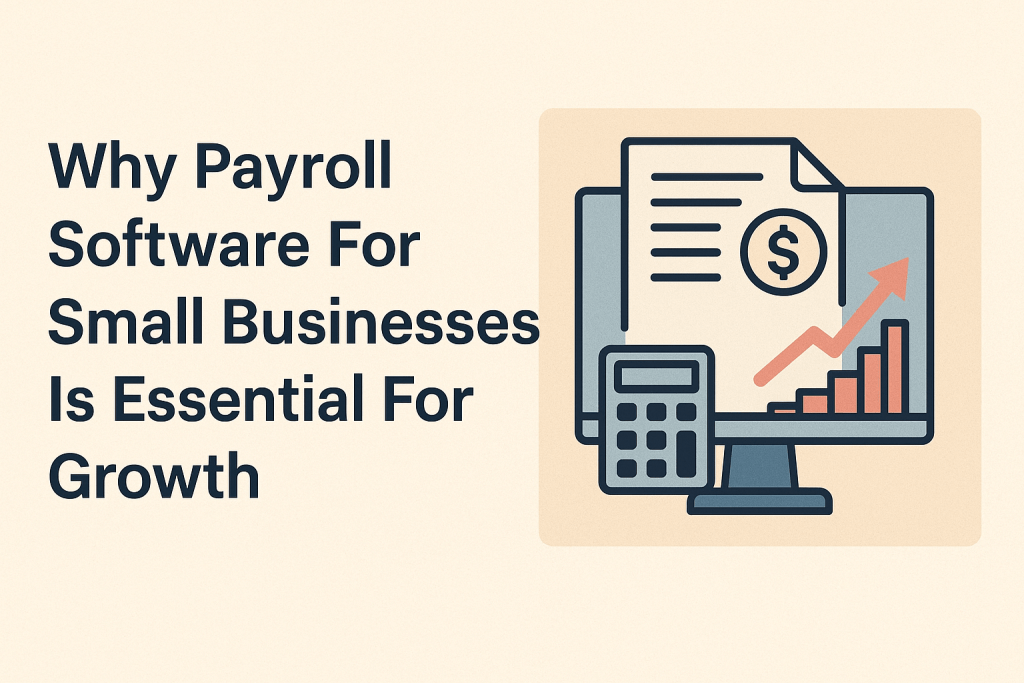The challenges of payroll can be an obstacle for small businesses to manage while aiming for growth and improved efficiency. Doing it the traditional way usually results in mistakes and wastes valuable time. Hence, payroll software comes into play — a perfect mixture of precision and ease. Now, let’s understand the importance of payroll software for expanding a small business.

Efficiency And Time-Saving
If processed manually, payroll can take a fair amount of time. Calculations and paperwork tend to ensnare owners and managers alike. A payroll software for small business automates these procedures, enabling them to redirect focus towards core functions. Integrated with features facilitating automatic calculations, tax updates, and direct deposits, payroll runs smoothly, and employees are paid on time with minimum admin effort.
Accuracy And Compliance
Making mistakes with payroll can be expensive and lead to lawsuits. In order to ensure that the risks mentioned earlier do not surface, payroll software reduces these risks with accurate calculations. It also keeps itself aligned with the current existing tax rules and the labor codes. It helps businesses avoid penalties for non-compliance and also instills trust among the workforce by ensuring they are paid correctly.
Cost-Effectiveness
Many consider it an unwanted cost; however, software is one of the major aspects of saving money. Lowering mistakes and sidestepping penalties directly affects the bottom line. This means employees can spend more time on activities that generate revenue for the company. This can prove to be more productive and profitable, making payroll software a good purchase.
Improved Data Management
Employee data management can be a time-consuming process if done manually. By utilizing payroll software, all the information can be centralized and is available during the introduction of employee records, tax documents, and payroll history. This level of organization makes audits and reporting a breeze. As everything is stored digitally, filtering out data becomes a faster process, making the entire operation more productive.
Scalability
Over time, as businesses expand, they invariably experience changes to their payroll needs. Payroll software enables scale, adding new employees to a growing enterprise with reduced friction. This flexibility allows businesses to grow without the worry of having to re-do their payroll system, making it easy to transition to the next stage of growth.
Employee Satisfaction
Timely and accurate pay is crucial for employee morale. Payroll software ensures that payments are processed on time, contributing to employee satisfaction. Additionally, many platforms offer self-service portals where employees can access their pay stubs and tax documents. This transparency empowers employees and reduces inquiries, further streamlining the payroll process.
Security
Employee salaries, personal information, and other sensitive data are not to be made available for access. Payroll software provides strong protection against unauthorized access to this information. Data confidentiality– Detailed encryption and secure access controls allow businesses to maintain the privacy of their data. That security builds confidence and safeguards against possible misinformation or scams.
Connecting With Other Systems
Most businesses are using different systems for HR, accounting, and time tracking. Often, payroll software integrates quite well with these platforms. This integration minimizes duplication of data entry and ensures uniformity across systems. Linking up these processes creates a more harmonious operational stream for businesses.
User-Friendly Experience
If there is concern about learning complex new software, modern payroll systems feature intuitive interfaces. These systems, designed to prioritize user experience, need little training. With easy navigation and guided processes, payroll management is not limited to technical users; anyone can manage payroll with ease.
Future-Proofing The Business
With the rapid growth of technology, it is very important to stay abreast of these changes. Payroll software providers frequently enhance their software with new, innovative technology. Such software helps businesses maintain relevance as their practices do not become obsolete.
Conclusion
Payroll software is not just a money management tool. It is a piece you can stand on that helps you scale, helps you be efficient, and keeps your employees happy. It provides small businesses with the tools to automate, stay compliant, and remain agile so that you can focus on the big picture: scaling and growing your business. Implementing payroll software is more than just a step-up; it is an investment in sustainability and growth.

